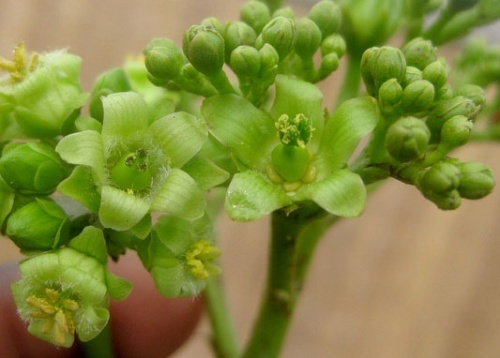
While the UN has heralded a cooperation agreement with a global crop technology company, Quinvita, which seeks to develop new technologies that can support sustainable development through the use of bio-energy crops in tropical regions, I also have concern that expansion of bio-fuel use has been responsible for food shortages as harvests are refocused on energy production. It is also fair though to incorporate into the analysis the growing component of fuel in rapidly rising food prices over the last few years. From petroleum use in fertilizers to fuel costs of transportation, escalating energy costs have become a substantial component of rising food prices. Perhaps bio-fuels can alleviate this component. (READ – “Surge in Green Energy Investment” -
diplomaticallyincorrect.org/films/blog_post/surge-in-green-energy-investments-by-ambassador-mo/30927
More Efficient Crops:
Energy crops, such as the Jatropha curcas flowering plant, (PHOTO Above), can be processed to produce a high-quality biodiesel fuel usable in standard diesel engines, increasing the potential for developing countries to maximize their resources, create jobs and increase incomes in rural areas. The partnership deal was signed by Director-General of the UN Industrial Development Organization (UNIDO) Kandeh K. Yumkella, and the chief executive of Quinvita, Henk Joos. “On the side of UNIDO, we see the potential of energy crops in developing countries. They can be key for producing green, renewable energy and for poverty reduction through the diversification of income for smallholder farmers. We will strive to combine the scientific, technical and financial resources of Quinvita and UNIDO to cooperate on the development of novel bio-energy crops,” according to Philippe Scholtès, Director of UNIDO’s agribusiness development branch.
Loss of Natural Habitats?
One of the other drawbacks of bio-fuels is the loss of natural habitats to huge agrabusiness plantations growing bio-fuel plants. The problem has been especially acute in development of palm-oil, from SE Asia to Africa. “Land Grabbing” from poorer subsistence farmers has also been a concern expressed by various UN agencies and related institutions/persons. READ -
diplomaticallyincorrect.org/films/blog_post/land-grabbing-threatening-food-security-by-ambassador-mo/35743 ).
In a news release issued by UNIDO, the agency notes that Quinvita was chosen as a partner because of its experience, knowledge and technology used to work with Jatropha plantations, as well as its advancements working with other traditional and new industrial crops. The two entities have already started cooperating in a project on the potential of bio-energy crops in West Africa, jointly implemented by the Economic Community of West African States (ECOWAS) and the Centre for Renewable Energy and Energy Efficiency (ECREEE).
READ -
diplomaticallyincorrect.org/films/blog_post/renewable-energy-rapid-gains-by-ambassador-mo/31716
By Ambassador Muhamed Sacirbey
Facebook – Become a Fan at “Diplomatically Incorrect”
Twitter – Follow us at DiplomaticallyX
Ecology-Diplomat Channel -
diplomaticallyincorrect.org/c/ecology-diplomat

